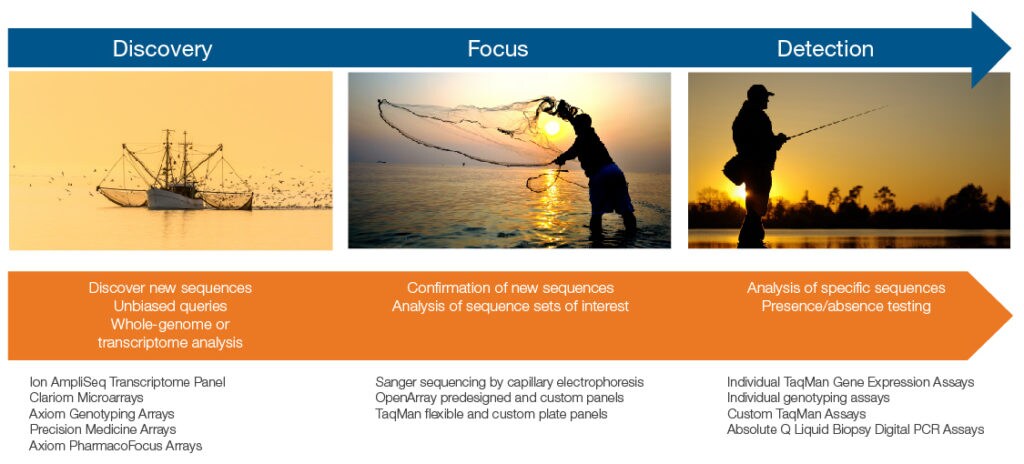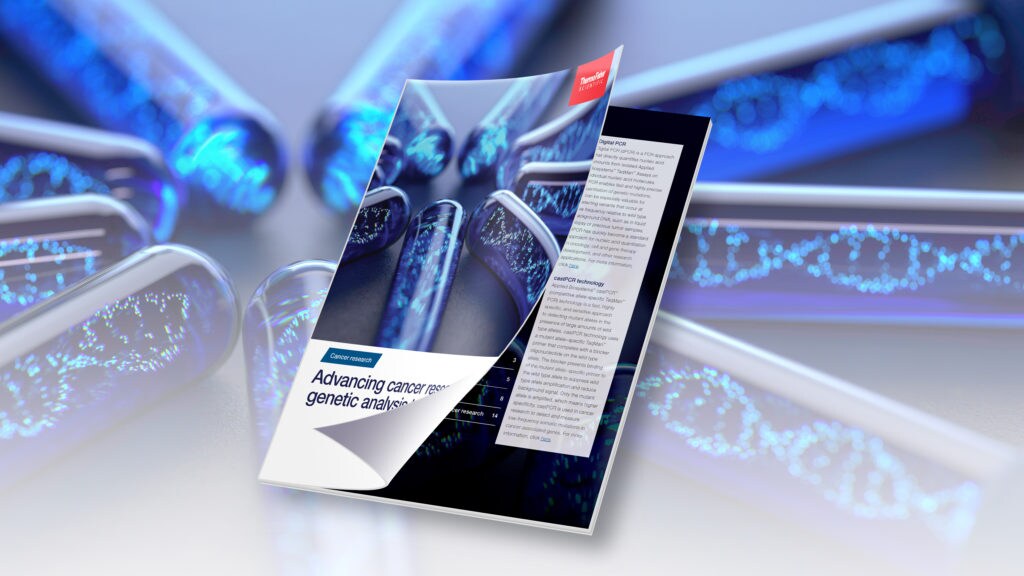Advanced Solutions for Your Cancer Research Challenges
When Facing a Formidable Foe, You Need a Little Extra Help
Cancer remains a formidable challenge, despite impressive developments in diagnosis, treatment, and research. A leading cause of death worldwide, cancer accounted for nearly 10 million deaths in 2020. (1) It is therefore not surprising that cancer remains one of the top-funded research areas. In 2022, the National Cancer Institute (NCI) at the National Institutes of Health (NIH) was allocated $6.9 billion, a $353 million net increase over the previous year. (2) In 2020/21, Cancer Research UK spent £421 million on various cancer research projects (3) and the European Union spent around €3 billion since 2007 to support ‘cancer research from the lab to the patient.’ (4)

Understanding the Cellular Genetic Landscape
Whether inherited or acquired, cancer is almost always associated with genetic dysfunction. Therefore, understanding the cellular genetic landscape to identify predictive and prognostic biomarkers of functional and clinical significance is key to cancer precision medicine. Despite significant progress in the field, only a fraction of cancer-associated genetic variants have been identified, and the molecular understanding of the events they provoke remains unclear in many cases. What’s holding us back?
Advances in Tools Empower Cancer Research
Current genetic analysis technologies don’t always give the full genomic picture, and often, data analysis and interpretation are so cumbersome that one fails to gain any actionable insights to take their research forward. In recent years, advances in time-tested tools such as quantitative PCR (qPCR), capillary electrophoresis (CE) sequencing, and microarrays, along with newer technologies such as next-generation sequencing (NGS), digital PCR (dPCR), and Applied Biosystems™ castPCR™ have empowered the cancer research community to tackle some of these challenges effectively. Let’s take a look at some examples from different areas of cancer research.
Genetic Analysis Tools to Probe the Molecular Mechanisms of Cancer
Precision Medicine
Conquering cancer through precision medicine relies on a deep understanding of the various molecular mechanisms at play – genetic mutations, epigenetic modifications, or a combination of both. Advances in qPCR, Sanger sequencing by CE, and microarrays are enabling researchers to probe deeper into the various mechanisms involved in cancer development and progression. For example, using Sanger sequencing by CE, Islam et al. identified multiple copy number mutations in the gene EPAS1, a gene induced by hypoxia and implicated in many cancers. Following up with qPCR (Applied Biosystems™ TaqMan™ qPCR assays), they correlated the copy number changes with EPAS1 mRNA overexpression. (5) In another study, the authors (Xu et al.) used RT-qPCR with human miRNA microarrays to explore the role of miRNA in mesenchymal-to-epithelial transition in liver-metastasized colorectal cancer. This study identified an upregulated miRNA derived from liver exosomes which correlated with a decrease in the rate of invasion of cancer cells in the liver. (6)

Genetic Tools to Detect Cancer Early
Early Detection Saves Lives
In cancer, early detection saves lives and cuts treatment costs. Newer genetic analysis technologies such as NGS, dPCR, and castPCR™, along with qPCR, microarrays, and CE are paving the way for individualized treatment strategies based on the early identification of cancer gene expression signatures. For example, Chalela et al. used a combination of tools to reveal driver mutations (EGFR/KRAS) in non-tumoral lung cells in subjects with early-stage lung adenocarcinoma who had tested negative for those mutations. They used Sanger sequencing to identify specific exons within the EGFR or KRAS oncogenes. castPCR and qPCR independently confirmed mutation status, and dPCR confirmed the presence of these mutations. (7)
dPCR is gaining traction as a potential diagnostic tool, particularly in cases where one requires accurate and timely tumor characterization from limited sample amounts. For instance, Saxena et al used high-density nanofluidic dPCR (combined with Applied Biosystems™ TaqMan™ Assays) to detect EGFR mutations, which are associated with treatment resistance and poor prognosis, from minute quantities of sample from solid glioblastoma tumors within 24 hours of surgery. (8)
Genetic Analysis Technologies to Identify Biomarkers
One size doesn’t fit all in cancer. For cancer precision medicine to become a reality at scale, we need genetic analysis technologies capable of identifying genetic biomarkers that can guide future diagnosis and treatment strategies, often using limited sample materials. Advances in NGS, PCR, CE, and microarrays are changing the way we discover novel biomarkers. For example, Hagi et al. developed a method using the Ion Torrent™ NGS system to detect circulating tumor DNA (ctDNA) in patients with esophageal squamous cell carcinoma. ctDNA amounts are notoriously low which makes it difficult to detect using conventional genetic approaches. The authors incorporated molecular barcodes into DNA fragments for sequencing, which reduced background errors to detect rare mutations at about a 40-fold lower variant allele frequency compared to the traditional molecular barcode approach. (9)

Cancer Research – Tackle Unanswered Genetic Questions With Expanding Tool Sets
Dig deeper into the technologies that enabled some of the most exciting discoveries in cancer research.
In this guide, you will find several area-and technology-specific examples, which might be just what you need to solve your current cancer research challenge.
Learn about
- Applied Biosystems technologies and how they could be used for cancer research
- Molecular mechanisms of malignancy; genetic and epigenetic mechanisms
- New approaches to cancer detection; solid tumor biopsy, liquid biopsy and genetic tests
- Cancer biomarker discovery; development of vaccines and therapeutics
» Download the eBook – Advancing Cancer Research with Genetic Analysis Tools
Related
» Applied Biosystems Solutions for Cancer Research – Applied Biosystems solutions have the answers to big oncology questions.
» Genetic Analysis Technologies for Immuno-Oncology Research – What technologies are used for genetic analysis in immuno-oncology?
—
References:
- Globocan 2020: https://gco.iarc.fr/today Accessed June 14, 2022.
- National Cancer Institute: https://www.cancer.gov/about-nci/budget Accessed June 14, 2022.
- Cancer Research UK: https://www.cancerresearchuk.org/funding-for-researchers/facts-and-figures-about-our-research-funding-0 Accessed June 14, 2022.
- Fighting cancer through research: How the EU is helping https://op.europa.eu/en/publication-detail/-/publication Accessed June 14, 2022.
- Islam F, Pillai S, Gopalan V, et al. Identification of Novel Mutations and Expressions of EPAS1 in Phaeochromocytomas and Paragangliomas. Genes (Basel). 2020;11(11):1254. Published 2020 Oct 24. doi:10.3390/genes11111254
- Xu H, Lan Q, Huang Y, et al. The mechanisms of colorectal cancer cell mesenchymal-epithelial transition induced by hepatocyte exosome-derived miR-203a-3p. BMC Cancer. 2021;21(1):718. Published 2021 Jun 19. doi:10.1186/s12885-021-08419-x
- Chalela R, González-García JG, Khilzi K, et al. EGFR and KRAS Mutations in Lung Parenchyma of Subjects With EGFR/KRAS Wild-Type Lung Adenocarcinoma. Pathol Oncol Res. 2021;27:598292. Published 2021 Mar 24. doi:10.3389/pore.2021.598292
- Saxena D, Sheikh S, Kao G, et al. Rapid and ultrasensitive digital PCR (dPCR) profiling of EGFRvIII in tumor cells and tissues. Neurooncol Adv. 2019;1(1):vdz030. doi:10.1093/noajnl/vdz030
- Hagi T, Kurokawa Y, Takahashi T, et al. Molecular Barcode Sequencing for Highly Sensitive Detection of Circulating Tumor DNA in Patients with Esophageal Squamous Cell Carcinoma. Oncology. 2020;98(4):222-229. doi:10.1159/000504808
Precision medicine startup OncoDxRx has eight transformative liquid biopsy pipelines currently are in different phases of research and development, validation and commercialization, with PGA (Patient-derived Gene expression-informed Anti-cancer drug efficacy) assays to be launched shortly. Other technologies include MRD, multi-cancer early detection as well as DNA repair activity measurement and cancer drug discovery. “OncoDxRx will thus secure its forefront position to deal with cancer patients in all stages, whether in the context of cancer screening and prevention or in the context of treatment selection, recurrence monitoring or drug discovery.” The company said in the statement.